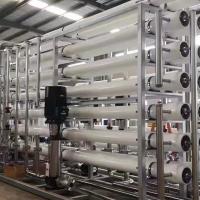1. Automotive Manufacturing
In automotive production, electrophoresis filters are crucial for
maintaining the cleanliness of the electrocoating bath during the
coating of vehicle parts. They ensure that the paint bath remains
free from contaminants such as metal chips, dust, or any foreign
particles that can negatively affect the quality of the coating.
This is especially important for parts like chassis, bumpers, and
other metal components that require high corrosion resistance and a
smooth finish.
- Key Benefits:
- Improved coating adhesion
- Higher resistance to corrosion and wear
- Enhanced surface appearance
2. Metal Furniture and Appliance Coating
Electrophoresis filters are commonly used in the production of
metal furniture and household appliances, such as refrigerators,
washing machines, and metal frames. The filter helps to remove
unwanted particles from the electrophoresis bath, ensuring that the
applied coatings are free from imperfections, ensuring better
aesthetics and durability.
- Key Benefits:
- Smooth, uniform coating
- Increased product durability
- Enhanced appearance and finish quality
3. General Metal Finishing
The electrocoating process is widely used in the general metal
finishing industry for parts ranging from small components to large
machinery. Electrophoresis filters are used to keep the coating
bath clean during the application of coatings on metal parts,
helping to improve the overall quality and consistency of the
finish.
- Key Benefits:
- Consistent and uniform coating
- Reduction in defects like runs and drips
- Increased corrosion resistance
4. Electronics and Electrical Components Coating
In the electronics and electrical industries, the electrocoating
process is used to provide protection for parts such as connectors,
circuit boards, and other sensitive components. Electrophoresis
filters are essential for maintaining a clean bath, preventing
contamination that could affect the functionality of these delicate
parts.
- Key Benefits:
- Reliable protective coatings
- Enhanced electrical conductivity and protection
- Reduced risk of failures due to poor coating
5. Industrial Equipment and Machinery Coating
For industrial equipment and machinery, such as pumps, valves, and
heavy machinery parts, the need for strong, durable coatings is
critical. Electrophoresis filters ensure the coating process
remains free of contaminants, allowing for a uniform,
high-performance finish that can withstand harsh operating
conditions.
- Key Benefits:
- Increased resistance to wear and corrosion
- Enhanced longevity of machinery parts
- Consistent, high-quality finish even on complex shapes
6. Coating for Decorative Applications
In decorative industries, where appearance is a critical factor,
electrophoresis filters are used to ensure that the electrocoating
bath remains free from impurities that could spoil the final
finish. This is especially important for decorative items like
metal jewelry, art installations, or even architectural elements.
- Key Benefits:
- Perfectly smooth, flawless finish
- Enhanced color and brightness retention
- Greater aesthetic appeal
Support and Services
We will provide the following technical support and services for
all products under the Jingtu Paint brand.
- Assistance with product installation and setup
- Troubleshooting and problem solving
- Guidance on proper use and maintenance
- Training and education on product features and functionality
- Regular software updates and patches
- Integration support with other systems or software
QA
1. What is the primary function of the Electrophoresis Filter?
The primary function of the Electrophoresis Filter is to remove
contaminants, dust, metal particles, and other impurities from the
electrocoating bath during the electrophoretic deposition (EPD)
process. This ensures that the coating applied to metal parts is
smooth, uniform, and free from defects that could affect the final
product quality.
2. What are the key advantages of using an Electrophoresis Filter
in the coating process?
The key advantages of using an Electrophoresis Filter include:
- Improved Coating Quality: Reduces defects caused by contaminants in the electrocoating bath.
- Increased Efficiency: Helps maintain a clean coating environment, allowing for
consistent coating quality.
- Cost Savings: Reduces the need for rework or material waste due to coating
defects.
- Longer Equipment Life: Helps maintain the integrity of the electrocoating system by
preventing buildup and clogging.
3. How does the Electrophoresis Filter improve the quality of the
electrocoating process?
The Electrophoresis Filter improves the quality of the
electrocoating process by keeping the coating bath free of
particles that could cause imperfections in the final finish. By
filtering out contaminants, the filter ensures that the
electrocoating process results in a more consistent, smooth, and
uniform coating with better adhesion and corrosion resistance.
4. What industries benefit most from using Electrophoresis Filters?
Industries such as automotive manufacturing, general metal
finishing, electronics, industrial machinery, and marine
applications benefit greatly from the use of Electrophoresis
Filters. These filters help ensure high-quality, durable coatings
for a wide range of metal parts exposed to harsh environments or
requiring aesthetic finishes.
5. How often do Electrophoresis Filters need to be cleaned or
maintained?
Electrophoresis Filters are designed for low-maintenance use.
However, they should be cleaned regularly to ensure optimal
performance. Depending on the frequency of use and the level of
contaminants in the bath, routine cleaning and occasional
replacement of the filter media may be required to maintain the
filter’s efficiency.
6. Are Electrophoresis Filters compatible with all types of
electrocoating systems?
Yes, Electrophoresis Filters are compatible with most
electrocoating systems, including both batch and continuous
electrocoating processes. They can be customized to suit the
specific requirements of different electrocoating systems and
applications, making them a versatile solution for various
industries.








